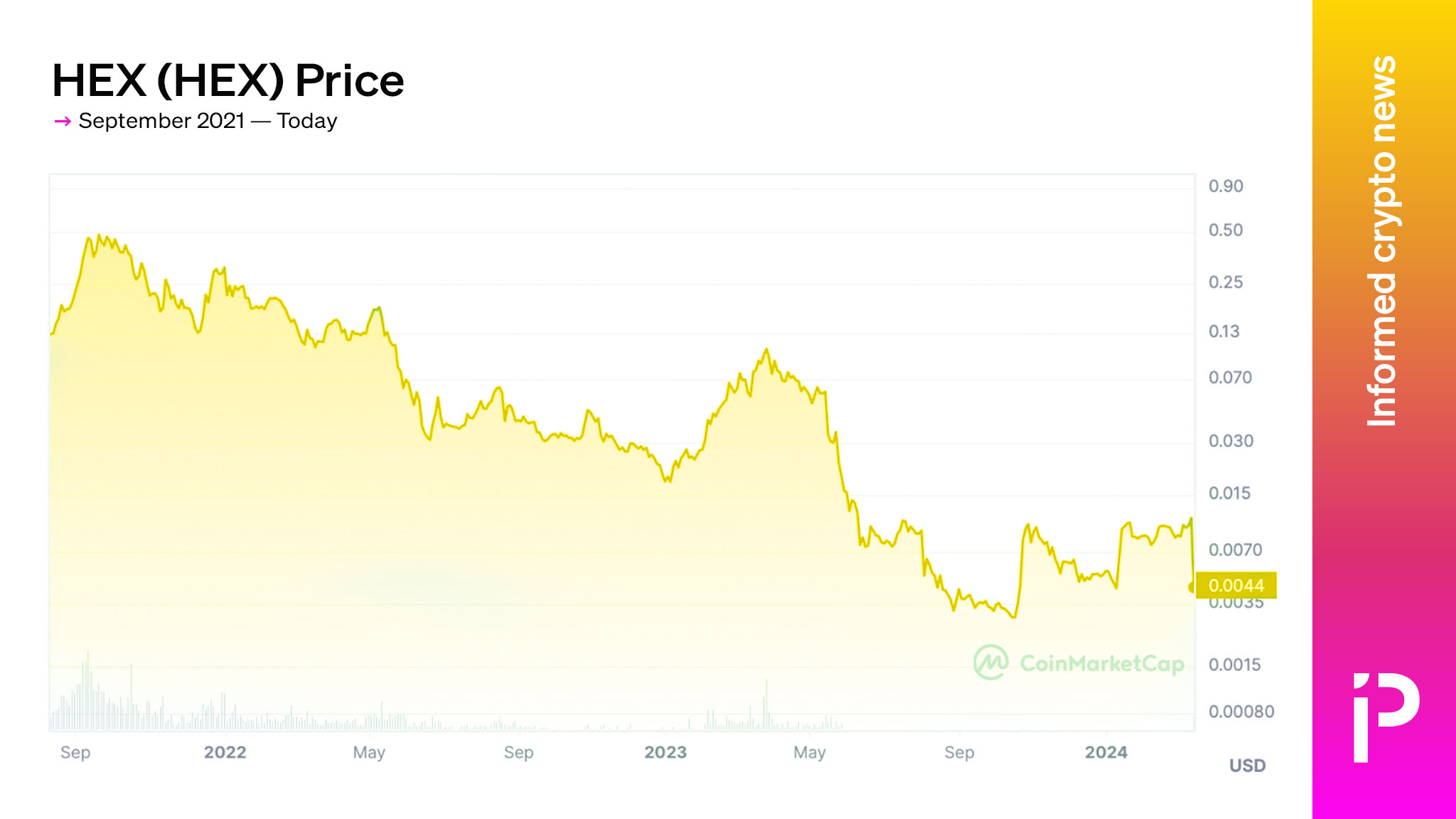On Sunday, a prominent member-turned-critic of Richard Heart’s HEX community, Eric Wall, tweeted an intraday chart of HEX-on-Ethereum’s collapsing price. He was dunking on Heart for allegedly causing the HEX rug pull and crypto members on X (formerly Twitter) duly dogpiled. They laughed, clicking the Like button on tweets about HEX’s supposed collapse tens of thousands of times.
Within hours of Heart’s tweet, HEX-on-Ethereum traded 68% lower.
HEX on Ethereum, the "immutable contract", the "it's just you and the code", the "real DeFi" just dumped over -50% because the founder, Richard Heart, tweeted today that he doesn't like it. pic.twitter.com/OV3vDe6bSe
— Eric Wall | OP_😺 (@ercwl) March 10, 2024
Read more: Richard Heart and the curious launch of Hex, Pulse, and PulseX
In reality, Heart didn’t rugpull HEX on Sunday. Nor has the value of HEX declined over the past three months.
To explain: HEX exists on two blockchains: Ethereum and PulseChain. Heart started HEX on Ethereum but claimed to migrate his focus to PulseChain in order to spare ‘Hexicans’ from Ethereum’s high fees. PulseChain, he claims, is faster and cheaper.
For context, Heart is an ex-Bitcoin maximalist who defected and created three altcoins: HEX, PLS, and PLSX. HEX is his flagship creation, featuring the ability to lock up HEX on-chain for future rewards. PLS is a fee (‘gas’) token for the PulseChain blockchain, and PLSX is a reward token for its most popular exchange.
The SEC is currently suing Heart, Hex, PulseChain, and PulseX for violating federal securities laws.
HEX on two blockchains
On Sunday, when Heart endorsed HEX-on-PulseChain and disavowed HEX-on-Ethereum, the price of HEX-on-Ethereum did crash -70% intraday (-54% as of publication time). That reduced its fully diluted valuation from approximately $6.4 billion to $2.6 billion as of publication time*: a loss of $3.8 billion for HEX-on-Ethereum.
However, the price of HEX-on-PulseChain increased on Sunday. Specifically, it rallied 11% as of publication time, up from approximately $11 billion to $12.3 billion as of publication time*: a gain of $1.2 billion for HEX-on-PulseChain.
In sum, the fully diluted market capitalization of HEX-on-Ethereum did, indeed, decline more than the offsetting rise in the fully diluted market capitalization of HEX-on-PulseChain.
However, there are two other complicating factors that make it difficult to conclude that Heart meaningfully caused any crash in the value of HEX on Sunday.

No HEX rug pull, just a slow decline
First of all, the launch of PulseChain coincided with a free duplication of all HEX-on-Ethereum (including unstaked and staked HEX) onto PulseChain. Any long-term holder of HEX prior to PulseChain’s debut received free HEX on PulseChain. Therefore, no long-term holder can be harmed by a decline in the value of HEX on Ethereum versus PulseChain — because they own an equal number of tokens on both blockchains.
Secondly, Heart has consistently emphasized the long-term nature of HEX staking. Therefore, considering a trailing period of three months rather than 24 hours, the USD value of HEX-on-Ethereum is trading flat near $0.0046. Over that same period, in contrast, the USD value of HEX-on-PulseChain has increased 60%.
Therefore, on the whole, the fully diluted valuation of HEX across both Ethereum and PulseChain blockchains has actually increased by over $6 billion within three months.
Still no excuse
This does not excuse, of course, the disastrous overall decline in the value of Heart’s altcoins which might never regain their all-time high market capitalization of $85 billion. Nor does it excuse years of sketchy behavior of the evasive founder. Moreover, it doesn’t answer questions about Heart’s lavish personal expenditures or diversions of the ETH and stablecoin collateral that once backed some of the briefly stratospheric valuations of HEX, PLS, and PLSX.
Richard Heart’s Pulse launch flops, users stranded, HEX crashes
Read more: The SEC can’t get in touch with Richard Heart, now what?
To little avail, Heart tried to point this out. Using his newly preferred nomenclature (referring to HEX-on-PulseChain as simply ‘HEX,’ despite his prior years of using ‘HEX’ in reference to HEX-on-Ethereum), Heart noted that HEX-on-PulseChain rallied 57% intraday on Sunday. That is true. Specifically, HEX-on-PulseChain has a larger fully diluted market capitalization than HEX-on-Ethereum, according to CoinGecko, which makes that 57% rally even more meaningful.
Regardless, skeptics dogpiled onto posts by Eric Wall (600 likes), Pledditor (1,400 likes), Wicked (330 likes), Stacy Herbert (770 likes), Mike Alfred (320 likes), and other crypto influencers. All laughed at the supposedly predictable, inevitable rug pull of HEX that consummated on Sunday.
The problem is that the rug pull didn’t actually occur yesterday. Nor over the last three months.
Instead, the decline in Heart’s altcoins has happened slowly — for the two and a half years since September 2021.
*Note: All market capitalization and price figures use CoinGecko data as of UTC 05:49:00 UTC on Monday, March 11, 2024. There is disagreement about the circulating supply of HEX across both blockchains. For this reason, CoinGecko does not display the market capitalization for either token.
 protos.com
protos.com